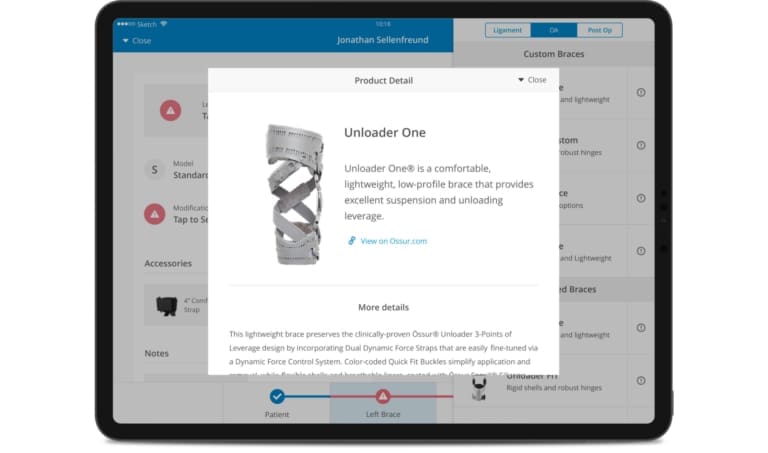Software Development Outsourcing in 2025: All the Essentials in One Place
Updated: February 20, 2024
Software development outsourcing isn’t a new business model, and the IT offshoring market size is growing steadily to $617.69 billion in 2024 and is expected to reach $806.53 billion by 2029. Should you follow the trend and capitalize on this opportunity? Before you get started, take a thorough look at outsourcing software development, its pros &cons, and discover how to efficiently employ this practice in your business processes.
Table of Contents
What is Software Development Outsourcing?
Software development outsourcing involves hiring a third-party service provider to handle specific parts of the software creation process. This approach lets businesses tap into external expertise, technology, and resources for software application development. It’s a strategy employed by companies of all sizes, from startups to multinational corporations, to meet various objectives such as cost reduction, accessing specialized skills, and speeding up time-to-market for new products.

We provide companies with senior tech talent and product development expertise to build world-class software. Let's talk about how we can help you.
Contact usThe practice encompasses a wide range of activities, including but not limited to coding, application design, testing, and maintenance. Companies might outsource a complete project, from conception to completion, or select phases of the development process, depending on their specific needs and internal capabilities.
Why Should Your Startup Outsource Software Development?
With no need for renting office space, setting up an entire development infrastructure, and putting together a professional team, outsourcing is faster and more cost-effective than in-house development. But what are the other reasons to outsource software development for startups and established businesses? Let’s find them out.
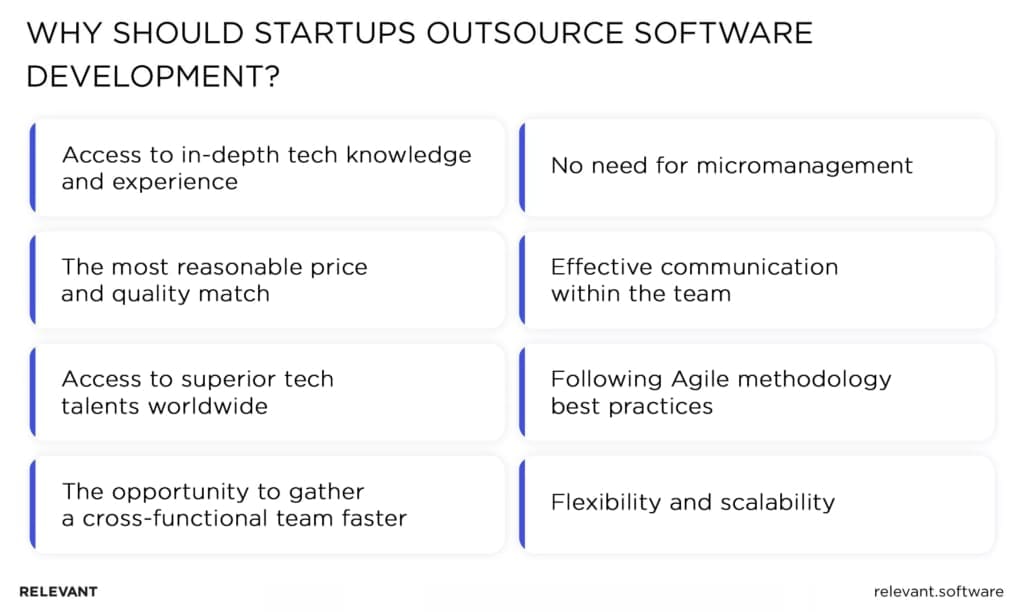
Access to In-depth Tech Knowledge and Experience
Software engineering outsourcing is a smart way to access the technical expertise you lack. With a product idea in mind, you can get an all-inclusive package of consulting, analytical, marketing, design, and development services.
Such instant access to technical talent, knowledge, and skills allows you to start developing your Minimum Viable Product (MVP) in the shortest possible time.
Project planning, cost estimation, wireframing, software development, UI/UX design — outsourcing companies can gather a cross-functional team according to your project needs, manage the development process, and bring your idea to life.
Access to Superior Tech Talents Worldwide
When you decide to outsource your product development, for example, your PLM software development project, or web design project, you are not limited by your geographical location. Your primary criteria can be the team’s skills and competencies.
View the company’s portfolio, read customer reviews, and ask about products the company has successfully built. All of this will help you find the perfect team for your project. No matter where they are located, this huge pool of talented developers will make your product development as efficient as possible.
What’s more, hiring from a global talent pool allows for embracing cultural diversity and driving innovations with people’s ability to think differently. However, sometimes there can be significant cultural differences, so we recommend looking for a middle ground between cultural diversity and cultural fit.
The Most Reasonable Price and Quality Match
Software development outsourcing enables you to find the perfect balance between price and quality. Depending on your outsourcing destination, you can accurately tailor your development budget to the local labor market trends.
For example, the countries of Eastern Europe, such as Ukraine or Belarus, are quickly rising in the outsourcing rankings. Software development companies operating in these countries have demonstrated quality service with the optimal balance of expertise and creativity.
On top of that, the development rates in Ukraine are significantly lower than in the US or Western Europe. By outsourcing to Eastern Europe, you will get a high-quality, professionally delivered product at a considerably lower cost.
The Opportunity to Gather a Cross-functional Team Faster
If you begin your project by building your own startup development team, consider the average time-to-hire in advance. Web developers aren’t the only specialists you need to hire. To create a technically powerful product that will be in high demand by the market, you also have to hire business analysts, UI/UX designers, QA engineers, and marketers.
Additionally, your project may require highly specialized skills, for example, if you want to employ VR (virtual reality) or AI (artificial intelligence) technologies. Looking for them on your own will significantly delay the time to market.
On the other hand, software development outsourcing companies usually have a complete team on board, or they can quickly recruit the necessary specialists much faster than the company with no hiring expertise will do it on its own.
No Need for Micromanagement
When you assign your project to an outsourcing agency, the project is coordinated by a project manager who is responsible for the day-to-day management of outsourced software development projects. The project manager is a bridge between the development team and the product owner.
Once you have approved the project plan and estimate, it is the responsibility of the project manager to keep to the agreed schedule and budget. Usually, the PM has already tried and tested methodologies for managing remote teams as well as in-house teams.
It will be the job of the PM to plan the sprints, set the deadlines, control the delivery, schedule, and prepare feature demos. Changes, suggestions, comments, complaints – you can address them to the project manager and get a quick response.

Effective Communication within the Team
Effective communication is at the heart of seamless project development. Fortunately, an outsourcing agency has the tools and platforms for effective communication and collaboration already established and functioning. Preparing a collaboration environment for your project will require minimum time and effort — a workspace in Slack, a project on GitHub, a board in Jira or Trello — and you are basically all set.
Following Agile Methodology Best Practices
It is paramount for a startup to adhere to the principle of lean development and remain flexible. Following agile methodology allows you to deliver a product with no resource waste resulting from incorrect management, poor communication, excessive complexity, or other issues related to project coordination.
The Agile methodology favors the lean approach. In the most common model, the product development process is broken down into sprints that usually last two weeks. Each sprint has a goal (the product increment), which is typically a feature or functional component. After the product increment is developed, it is then tested and demonstrated at the end of the sprint.
Agile allows for revision on the go and adapting the development process to changed requirements. Over the lifecycle of a project, this reduces the need to redo finished components to a minimum.
Flexibility and Scalability
In the course of project development, the scope of the project may either grow or reduce, driving the necessity to change the project course. In such a case, the initially selected team should be scaled up or down, which is pretty challenging if you develop software in-house.
If you need to reduce the team, you will either have to dismiss people and risk being unable to replace their skill set in the future or continue paying their salaries to keep them onboard for future projects.
With software development outsourcing, you can avoid these problems because the agency usually has sufficient staff to cover your project needs. When unique skills are required, they can contract a part-time team member hourly as needed. Similarly, reducing the team is no problem for an outsourcing agency since they may be running more than one project at the same time and can assign a colleague to another project.
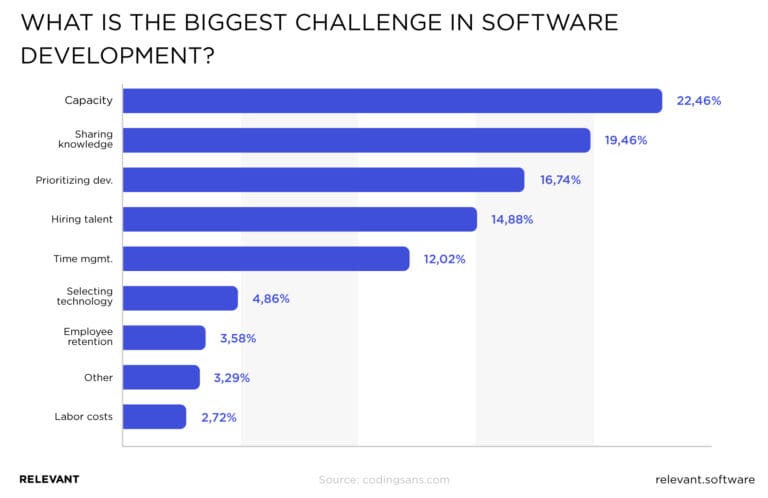
4 Possible Risks of Outsourcing Development Work
Despite all the benefits software engineering outsourcing promises, this development tactic also comes with its own risks and challenges. Discover them in advance so that you can make a fully-informed decision and outsource software projects in a hassle-free way.
Making the Right Choice with the Vendor
Choosing a trusted vendor to hire for outsourcing software development services is the main challenge both mature companies and startups face. However, if you make the right choice, the probability of facing other development outsourcing risks tends to be zero. With a reliable outsourced software company nearby, you can be sure that your development team will have the necessary expertise, your project will be created on time and launched to the market with no bugs, there will be no data safety issues, and your overall collaboration will be transparent and effective.
Project Control
Loss of control over the project is one of the main concerns business owners have when it comes to outsourcing software development. That’s why it is worth discussing communication and reporting practices in advance. What’s more, development vendors usually encourage project owners to be engaged in the development process, communicate with the Project Manager and the team directly, and frequently share their feedback.
Sensitive Data Safety
When you outsource software development, you also have to share insider information about your business and discuss innovative ideas with your development vendor. To protect your sensitive data and business reputation, make sure to sign a Non-Disclosure Agreement (NDA) before the first consultation.
Hidden Costs
Hidden costs are another risk of outsourcing IT development. To avoid this risk, make sure to carefully choose your engagement model and the corresponding type of contract (we will overview them further), ask for precise estimates, and agree on reporting and billing approaches in advance.
Software Development Outsourcing Models
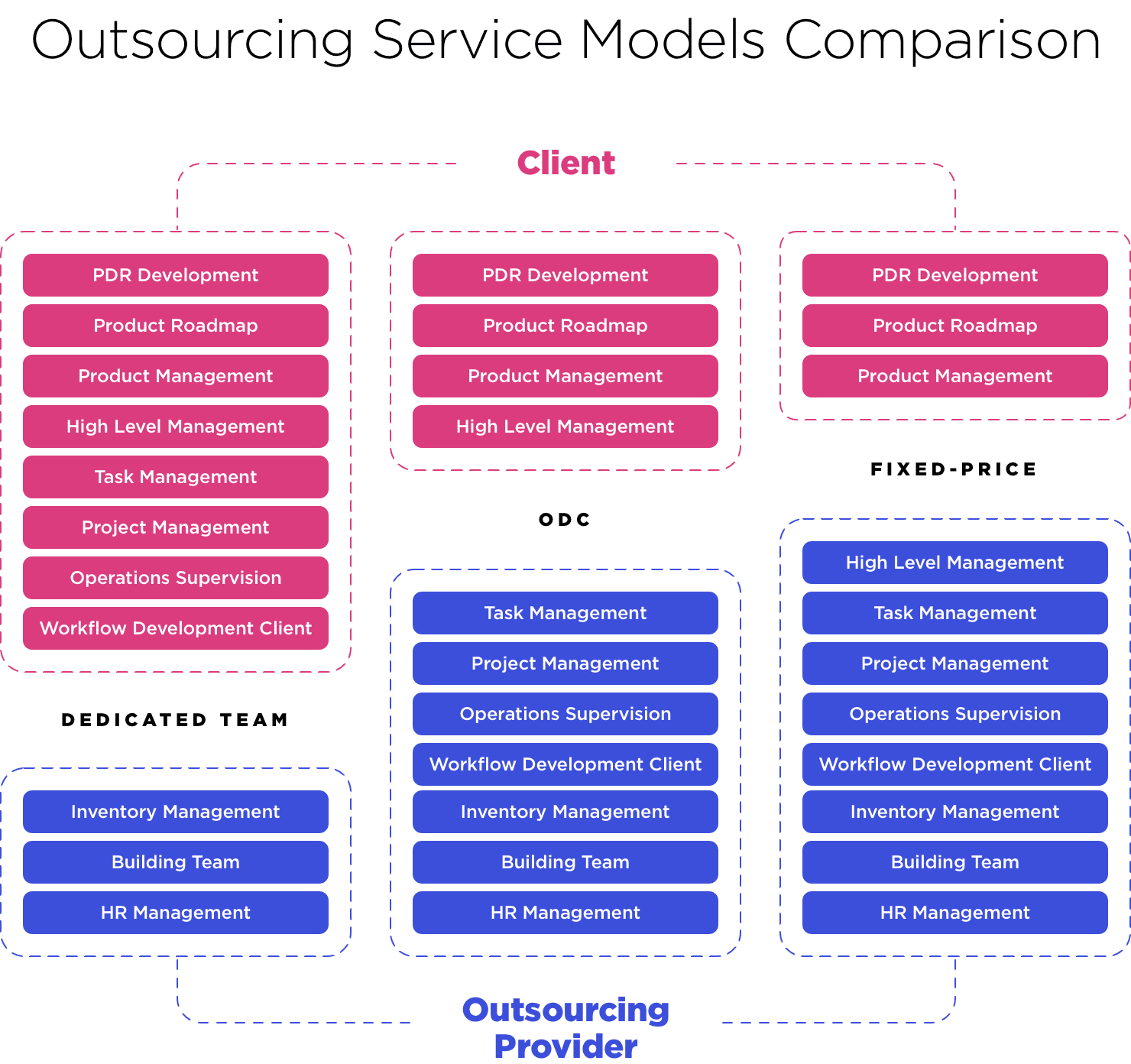
The outsourcing software development process involves more than simply paying a third-party vendor to code something for you. In fact, the development begins with the selection of an outsourcing model.
So, let’s discuss three main software outsourcing engagement models in 2025: time and material (T&M), fixed price (FT), and dedicated team in more detail.
Time and Material Contract
Using T&M, the client pays for the time spent exclusively on the development. This model is best suited for small or medium projects without predetermined requirements. It also makes sense when it’s hard to get accurate estimates right from the start.
Pros
- Flexibility: It’s well-suited for projects where requirements are expected to evolve or are not fully defined at the outset.
- Adaptability: Changes can be easily accommodated without the need for extensive renegotiations, making it ideal for agile development processes.
- Transparency: Clients have a clear view of where and how their budget is being utilized to outsource software development.
Cons
- Budget Variability: The total cost can be unpredictable, as it depends on the project’s duration and complexity, which might extend beyond initial estimates.
- Requires Oversight: Clients may need to actively manage and monitor the project to keep costs in check and ensure progress aligns with their goals.
- Slow time-to-market: T&M involves lots of communication throughout the project, which slows down the process.
Fixed Price Contract
The fixed-priced model assumes that both parties agree on the specifications, project scope, and cost in advance. Since there will be no modifications on the go, this model works best for small projects. FP is a perfect solution when you want to try out collaboration with a new software development vendor.
Pros
- Budget Certainty: Clients know the exact cost upfront, which simplifies budget planning and financial forecasting.
- Simplicity: The straightforward nature of this model makes it easy to understand and administer for both parties.
- Time-to-market: Since the time frames are agreed upon in advance, the project is more likely to be delivered on time.
Cons
- Limited Flexibility: Any deviation from the initial plan can lead to additional charges or require contract modifications, which can slow down progress.
- Risk of Quality Compromise: To stay within the agreed price, outsourcing partners might prioritize speed over quality.
- Scope Definition: Requires a thorough and precise definition of the project scope from the beginning, which can be challenging for complex projects.
Dedicated Team Contract
With the dedicated team model, throughout the project, the client pays a fixed monthly salary to the hired specialists in addition to administrative costs. This collaboration type is well-suited for long-term projects with vague requirements and large in-house projects when the client’s staff lacks specific expertise.
Pros
- Team Integration: The dedicated team acts as an extension of the client’s in-house team, fostering seamless collaboration.
- Control and Flexibility: Clients have significant control over project management and can adjust the team size or composition as needed.
- Long-Term Engagement: Ideal for ongoing projects with variable scopes, where having a stable team ensures consistency and a deep understanding of project objectives.
Cons
- Possibly changing requirements: The flexible nature of a project gives a remote team room for creativity, which can result in discrepancies between the client’s expectations and the end result.
- Higher Initial Investment: Setting up a dedicated team can require more time and resources upfront compared to other models.
- Management Responsibility: Clients may need to invest in management and communication tools to effectively coordinate with the outsourced team.
For ease of reference, Relevant’s dedicated software development team has summarized the key aspects of each model in the table below:
| Feature | Time & Material (T&M) | Fixed Price (FP) | Dedicated Team |
| Payment Model | Pay for actual time spent and resources used | Pay a pre-agreed fixed price for the complete project | Pay a monthly retainer for the dedicated team’s time and resources |
| Flexibility | Most flexible, accommodates changes easily | Least flexible, changes often require additional costs and delays | Moderately flexible, adjustments might require renegotiation |
| Project Scope | The client maintains more control over development process | Clearly defined and fixed scope required | Flexible scope, ongoing development based on changing needs |
| Project Management | Shared responsibility between client and vendor | Primarily vendor responsibility | Shared responsibility, with emphasis on close client collaboration |
| Control | The client has less control, relies on vendor expertise | Client has less control, relies on vendor expertise | Shared control, with regular communication and feedback loops |
| Risks | Costs can exceed budget if scope changes | Client takes on project risk if scope changes or development takes longer than expected | May require more upfront investment, potential challenges in integrating team |
| Cost Transparency | Transparent costs, pay only for what you use | May require cost estimation and careful planning | Predictable monthly cost, but potential hidden fees |
| Suited for | Small, well-defined projects, iterative development, ongoing maintenance | Well-defined projects with clear requirements, limited risk tolerance | Long-term projects, ongoing development, complex projects requiring ongoing collaboration |
As you can see, there are no right or wrong models to outsource software development. Your choice will depend on your business type and project requirements.
How to Develop Your Outsourcing Strategy?
Increased productivity, improved product quality, and reduced costs are only a few of the benefits that outsourced software development has to offer. Nevertheless, you won’t successfully outsource IT development without thorough planning, so having a solid outsourcing strategy is a must. But how can you create one? Below are a few things for you to consider.
Define Your Goals
Reducing cost is a common reason to outsource software development, but it’s not the only good reason to do so — don’t limit yourself to searching for a vendor based solely on price. The use of advanced technologies, streamlined processes, and reduced risk of business expansion are other benefits of outsourcing. Your goals should be realistic, well-balanced, and achievable.
Define Tasks Scope
While some companies are known for coding excellence, others offer stellar consulting services. To find a perfect outsourcing fit, it’s critical to define exactly which tasks you want to outsource. For software development projects, this often includes creating a Software Requirement Specification (SRS) document, which outlines the functional and non-functional requirements of the software. A well-drafted SRS document will help clarify the scope of work, ensure that the vendor understands the project’s specific needs, and serve as a guiding document throughout the development process.
Determine Your Technological Profile
Since software development outsourcing usually takes place in a remote setup, it’s crucial that your vendor has a technological profile suited to your needs. To this end, we recommend making a list of the resources your project requires. To get competent advice, consider tech consulting services, preferably from several different vendors.
Choose Your Outsourcing Destination
Since software development outsourcing usually takes place in a remote setup, it’s crucial that your vendor has a technological profile suited to your needs. To this end, we recommend making a list of the resources your project requires. To get competent advice, consider tech consulting services, preferably from several different vendors.
There are a lot of winning destinations for outsourcing development. For example, hiring Indian programmers is the most budget-friendly option, which can be suitable for first-time startup initiators.
The countries of Latin America can be a good choice for US-based projects that would like to have no time zone gap with their teams but have an opportunity to easily meet them in person.
Easter Europe, in turn, stands somewhere in between, offering the most reasonable price and quality match, wide pools of top-skilled development talent, convenient location, and investment-friendly legislation.
Decide on the Engagement Model
Before you outsource software development services, make sure to decide on the engagement model that best suits your project. Follow the advice we’ve shared above, or get in touch with our IT outsourcing services company for a free consultation.
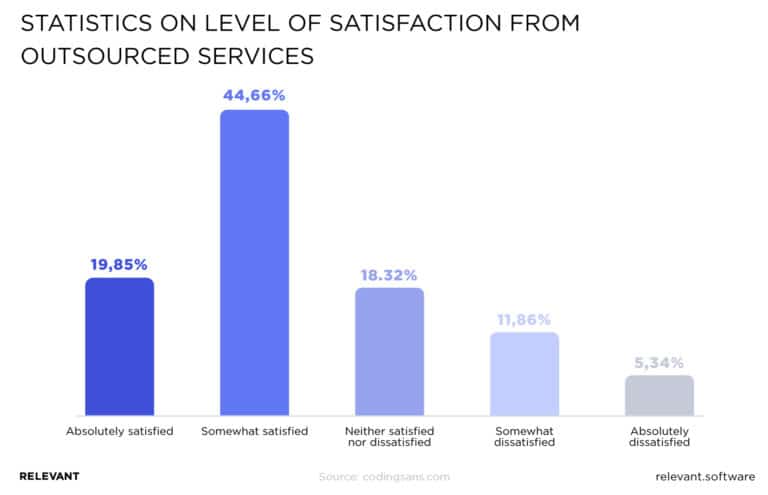
How is Software Development Usually Done?
No matter how complex a software product is, it needs to be flexible and easy to maintain and upgrade. You can achieve it by planning each step in advance, from brainstorming to maintenance. While the phases of the software development life cycle (SDLC) can be slightly different, we at Relevant follow the next ones.
- Ideation
- Planning
- Design
- Coding
- Testing
- Deployment and maintenance
Let’s take a closer look at each of them.
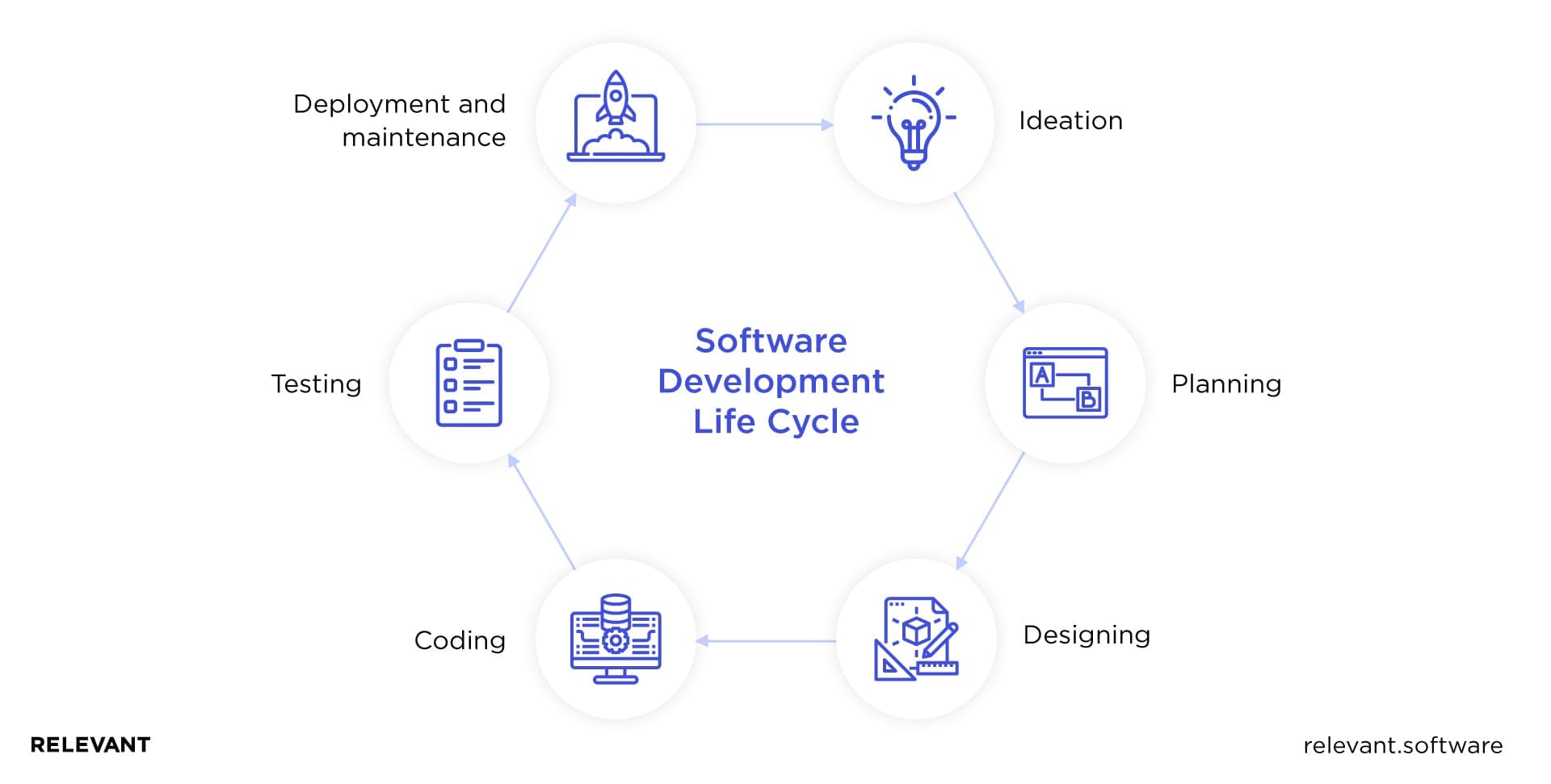
Ideation
Every project starts with an idea. However, ideas don’t come out of nowhere. First, you must identify a business need and then consider ways to bring it to life. In most cases, the project initiation phase includes the following:
- Validating the idea via PEST (Political, Economic, Social, and Technological) factors, SWOT (Strengths, Weaknesses, Opportunities, and Threats) analysis, Porter’s Five Forces, and conducting focus group research to minimize possible risks
- Determining the project’s scope
- Identifying deliverables (the project’s expected results)
- Defining stakeholders
- Developing a business case that provides the justification for undertaking the project
- Coming up with a statement of work that specifies the project’s objective(s), scope, and deliverables
Planning
The planning phase typically includes the following steps:
- creating a project plan
- building your team
- identifying the role of each team member
- estimating the budget
- making sure everyone has the necessary resources (both hardware and software)
- anticipating risks
- creating risk mitigation plans
- gathering Software Requirements Specifications (SRS).
One of the main cornerstones of your success is well-organized documentation. Consistency around documentation at every stage is vital for maintaining proper communication, work processes, reporting, and facilitating interaction between team members.
It’s strongly recommended that you summarize everything done during the planning stage with a software requirements specification (SRS) — a document that specifies what a product should do and how it should be developed.
Designing
Design is a crucial component of the software project’s lifecycle. It may include the following:
- Architecture — the overall skeleton of the product
- User interface — the way users will interact with the product and how it will respond
- The definition of platforms on which the product will run (Android, iOS, etc.)
- Communications — ways the product will communicate with other assets (the central server, for example)
- Security — measures to protect the app from data leakages, such as SSL encryption, password protection, and the like
The design phase also involves creating a prototype, the visual representation of how the project looks and works.
Coding
As the backbone of the SDLC, this stage is all about ‘translating’ the product’s design into the actual software.
While a small project can be completed by a single developer, for large projects, all tasks are divided among team members based on their areas of expertise. Thus, a front-end developer builds the product’s UI and its communication with the server; database administrators add all the necessary data to the database, and the back-end developer connects the front and back parts of the application into a single system.
It’s vital to make sure that the code meets the project’s requirements and lives up to the stakeholder’s expectations. No wonder this stage is the longest. Yet, if the ideation and planning have been carefully completed, it’s also the easiest one. The goal of this phase is to build a working product and a source code document.
Testing
As soon as the development phase is completed, it’s time for QA experts to check if there are no bugs, errors, and security gaps. For this purpose, the software undergoes several types of testing:
- Functional testing, to verify that the software performs its stated functions in a way users expect
- Performance testing, to see how the software performs under a heavy workload
- Unit testing, to make sure that each module performs as expected
- Security testing, to ensure that the software has no security loopholes that can cause data leakage
- Usability testing, to find out if the software is intuitive and responsive
Once an identified error is fixed, developers then forward the software back to the QA team for re-testing. This process repeats until the entire product is bug-free.
Deployment and Maintenance
As soon as the testing phase is successfully completed, and there are no bugs or other imperfections in the product, it is delivered to the market for beta testing. During the beta testing, the support team collects user feedback, and if any problems arise, the development team fixes them.
Only after the product is fine-tuned in response to real-world feedback is it finally rolled out to the market. Its life cycle doesn’t end there: instead, the product is regularly updated to improve performance and cater to the ever-changing needs of its users.
You may find interesting how to hire iOS development team as well as Android.

We provide companies with senior tech talent and product development expertise to build world-class software. Let's talk about how we can help you.
Contact usWhere to Outsource and How Much Does It Cost?
Cost optimization is one of the main reasons why businesses outsource. Factors such as taxes or the cost of office space vary from country to country. As a result, outsourcing the software development process to certain destinations may cost you a fortune. For example, an average software developer in the US earns $107,364 annually. This means that US developers earn 5-8 times more than their Indian counterparts.
The vendors with the lowest cost, however, may not deliver the best quality. Analyzing different countries based on the following criteria will help you find your perfect outsourcing destination:
- Tech education opportunities
- Positions in global ratings of IT destinations
- Time zone difference
- The level of English proficiency
- Resources availability and tech competency diversity
- Cultural fit
Based on these criteria, Ukraine is considered to be one of the best outsourcing destinations worldwide, and the affordable monthly salaries of Ukrainian developers ($5000 per month on average) are not the only reason for that.
Due to their extensive educational backgrounds and comprehensive skill sets paired with mature management teams, local dedicated software development teams have consistently demonstrated their ability to produce a high-quality end product and provide services to meet all the needs of their customers.
Moreover, you can find almost every cutting-edge tech skill here, whether you need AI, robotics, or IoT, highly customized application development (e.g., equity management software development), predictive software development techniques, or modern mobile app development. Hiring an iOS development team as well as Android is effortless in Ukraine.
On top of that, R&D initiatives (like Diia City and Startup Fund) are booming within the tech and software engineering sector in Ukraine. Companies like IBM and Microsoft have taken notice; they are already adopting the improved tech and field-specific advancements of the local IT market for their research and development needs. Such tech giants as Intel, eBay, Apple, and SolarWinds are leveraging the rich Ukrainian IT and software development ecosystem.
While the future of Ukraine’s tech R&D landscape is promising, challenges remain. The ongoing war poses logistical and operational difficulties for some companies. However, the resilience and ingenuity of the Ukrainian tech community, coupled with ongoing international support, provide a strong foundation for continued growth.
Choosing Your Perfect Software Development Vendor
With 23 million developers worldwide, it may seem impossible to choose the right software development outsourcing partner. In fact, the selection process is similar to choosing any other service provider — with a few industry-specific amendments, of course.
To find your perfect fit, you should take the following steps:
- Identify what you need (an app type, platforms to run your app, tech stack, estimated deadlines, etc.).
- Search for the companies based on your identified needs.
- Choose several companies, explore their websites, browse case studies, try to find their profiles somewhere other than their own sites (LinkedIn, Clutch), and read their corporate blogs and Google customer reviews.
- Reach out to the chosen companies to learn about their rates, expertise, certifications, security measures, communication style, etc. Sift through your list in response to the information you receive.
- Reach out to clients of the shortlisted vendors and ask for references.
- Discuss your project with the selected companies. Ask the potential software development outsourcing partners for estimates on time and budget.
- Finally, ask the remaining companies to do a test. The task shouldn’t take more than two working days. Whatever the result, always pay for the test assignment.
The company that has met all the evaluation criteria listed above is likely to be a reliable outsourcing vendor. To learn more details on each of the steps, please read our blog post.
Software Development Outsourcing Contract Details
After you have found your perfect software development vendor, the next important step is to sign the software development outsourcing contract. Like an agreement for any other service, a software development contract includes general terms, termination conditions, dispute resolution, and so on. There are some specific sections to include for IT outsourcing, though:
- The services. This section should describe in detail the services and the project scope that you expect your outsourcing partner to deliver, as well as the process for making changes to the scope.
- Project time and cost. Here, you should specify hourly rates, development phases, milestones and their deadlines, responsibility for delays, payment schedules, and the like.
- Acceptance testing (AT) is a test conducted to determine whether contract requirements are met. This section states which party is responsible for the testing, how long it takes, and how the results are communicated.
- Intellectual property rights. The end product is the customer’s property; it does not belong to the developer. Make sure the contract clearly states that.
- Confidentiality. This section specifies what information is considered confidential and the responsibilities and consequences of disclosing it.
Signing the contract makes your relationship with the software development vendor official. Now, your partner can start writing the code for your product.
Your Relevant Outsourcing Partner
Finding a reliable outsourcing partner can be a daunting task. Fortunately, you are at the right place to outsource your development process in the most efficient way.
Relevant is an offshore software development vendor with highly skilled Ukrainian developers for hire. Our mission is to help existing businesses and startups build world-class software in a cost-efficient way. We’ve been successfully providing the following services since 2013:
- Dedicated team
- Web and mobile app development
- Quality assurance
- Digital design
- Cybersecurity
- DevOps
- AI/ML
- Salesforce development
To date, there are more than 200 success stories under our belt.
Software Development Outsourcing: Summary
Outsourcing software development is both cost-effective and challenging. Yet, with the right service provider, scrupulous contracting, and clear communication of your business requirements, you will access in-depth tech knowledge and battle-proven development practices at no overhead cost. Our team would be glad to build a thriving development team, share our technical insights, and grow your project from an idea to a market-disruptive one.
Drop us a line to leverage all the benefits software development outsourcing promises!
FAQ
Our core services:
Do you want a price estimate for your project?
Do you know that we helped 200+ companies build web/mobile apps and scale dev teams?
Let's talk about your engineering needs.
Write to us

